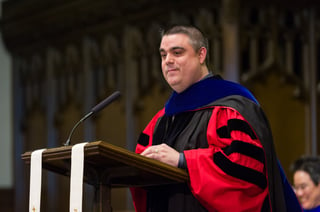This address was given by Demian Wheeler, Assistant Professor of Philosophical Theology and Religious Studies, to the 2017 graduating class of United Theological Seminary on May 7, 2017.
 You, the graduating class of 2017, will always be very special to me. You are my first students. My father, who taught high school English for 35 years, assures me that you will be etched in my memory for the rest of my life.
You, the graduating class of 2017, will always be very special to me. You are my first students. My father, who taught high school English for 35 years, assures me that you will be etched in my memory for the rest of my life.
Whatever drew you to this seminary, be it a clear sense of call or just theological curiosity, you have left an indelible mark. You have made United better. And now you will help make a better world, a more just, peaceful, and sustainable world. You came here with exceptional gifts of your own. And now you leave having acquired a rare set of skills, skills for pastoral care, for biblical exegesis, for preaching and worship, for social transformation, for ethical leadership. In these years of study, you have been formed—spiritually, intellectually, interpersonally, theologically. You have become more firmly rooted in your own tradition and have engaged the traditions of others. You have considered the correlations between religion and culture, including the intersections between theology and the arts. You have probed profound existential questions, pondered the meaning of life, and changed your theology—at least three times. You have juggled school, work, and family, pulled all-nighters, made financial sacrifices, written papers and maybe even a thesis, sat through countless hours of classes, completed CPE, served a church, and probably endured the difficult process of deconstructing some deeply held but deeply problematic beliefs. You have found your voice and have had some revelations along the way. Look around: remember that you have not done this alone. And many of the bonds that have been forged over these last few years will indeed last a lifetime.
Today, you go forth into the world as United graduates. Whether you know what you are going to do with your degree or not, continue to imbibe and embody this seminary’s deepest values.
Be theological innovators, prophetic ministers, social entrepreneurs, and agents of truth and beauty, peace and reconciliation, justice and liberation, compassion and ecological sanity.
Be historically conscious progressives. That is, be forward-looking without forgetting that our histories and traditions supply the raw material out of which our futures are made.
Seek the sacred in the profane, the transcendent in the immanent—in the arts, in the sciences, in culture, in nature, in human community, in the streets.
Cultivate a faith that is contemporary and credible, constructive and cutting-edge, critical and self-critical. When thinking theologically, have the courage to use your own reason and experience and find the middle ground between authoritarianism and relativism. Open yourselves to new knowledge, follow the truth wherever it leads, and always be honest—with yourselves, with others, with God.
But couple that honesty with humility. Hopefully, you know more today than you did when you matriculated. Nevertheless, remember that we are surrounded by a cloud of unknowing, that whatever is divine or ultimate is an inscrutable mystery. So, err on the side of agnosticism, not absolutism. Live the questions rather than feign definitive answers.
Be religious interreligiously, for no single faith has the market cornered on spiritual and theological truth. Ecumenism and religious pluralism are not problems to be solved but opportunities to be seized. Leave the safety of your parochial enclaves from time to time, become vulnerable to critique and correction from other religions and secular points of view, and engage in dialogue and deep learning across religious (and denominational) borders.
Whether you are pantheists, panentheists, polytheists, post-theists, or plain-old theists, be humanists and naturalists, at least in the loose sense. That is, honor the inherent worth and dignity of all human beings and respect the interdependent web of existence of which we humans are a part.
Finally, I leave you with the charge given to me at my seminary graduation: never lord your education over others. Rather, use it to help build the beloved community, the kingdom of God, the world we all want to live in.
Congratulations, graduates! You will be missed.




Your Comments :